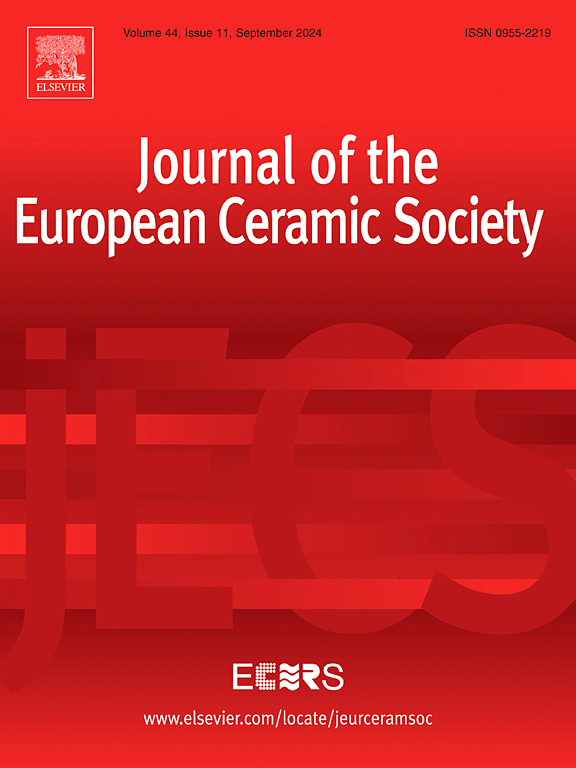提高透明度:用于先进辐射应用的 Gd2Zr2O7 陶瓷的缺陷驱动烧结
IF 5.8
2区 材料科学
Q1 MATERIALS SCIENCE, CERAMICS
Journal of The European Ceramic Society
Pub Date : 2024-10-28
DOI:10.1016/j.jeurceramsoc.2024.117030
引用次数: 0
摘要
透明 Gd2Zr2O7(GZO)陶瓷在辐射探测和核能应用方面具有巨大潜力。然而,由于该材料熔点高、热导率低,通过具有成本效益的固态真空烧结进行规模化生产具有挑战性。本研究引入了一种新方法,通过加入过量的钆来增加晶格缺陷,如形成能较低的阳离子无序和氧空位。这种策略降低了离子扩散的能量障碍,增强了烧结过程中的材料迁移,并促进了残留孔隙的消除,从而实现了高致密化。我们研究了不同钆含量(Gd1.8Zr2O6.7 至 Gd2.5Zr2O7.75)的 GZO 成分在 1450°C 至 1900°C 真空烧结过程中的致密化行为,重点关注相变、晶粒生长和孔隙消除。值得注意的是,最佳样品的透射率达到了 78.3%,接近理论最大值。这些发现为用于先进辐射应用的透明 GZO 陶瓷的大规模生产和商业化提供了一条前景广阔的途径。本文章由计算机程序翻译,如有差异,请以英文原文为准。
Promoting transparency: Defect-driven sintering of Gd2Zr2O7 ceramics for advanced radiation applications
Transparent Gd2Zr2O7 (GZO) ceramics show significant potential for radiation detection and nuclear energy applications. However, scalable production through cost-effective solid-state vacuum sintering is challenging due to the material's high melting point and low thermal conductivity. This study introduces a novel approach by incorporating excess Gd to increase lattice defects, such as cation disorder and oxygen vacancies, which have low formation energy. This strategy lowers the energy barrier for ion diffusion, enhances material migration during sintering, and promotes the elimination of residual pores, leading to high densification. We examined the densification behavior of GZO compositions with varying Gd content (Gd1.8Zr2O6.7 to Gd2.5Zr2O7.75) during vacuum sintering at 1450°C to 1900°C, focusing on phase transformation, grain growth, and pore elimination. Notably, the optimal sample achieved 78.3 % transmittance, approaching the theoretical maximum. These findings offer a promising route for the large-scale production and commercialization of transparent GZO ceramics for advanced radiation applications.
求助全文
通过发布文献求助,成功后即可免费获取论文全文。
去求助
来源期刊

Journal of The European Ceramic Society
工程技术-材料科学:硅酸盐
CiteScore
10.70
自引率
12.30%
发文量
863
审稿时长
35 days
期刊介绍:
The Journal of the European Ceramic Society publishes the results of original research and reviews relating to ceramic materials. Papers of either an experimental or theoretical character will be welcomed on a fully international basis. The emphasis is on novel generic science concerning the relationships between processing, microstructure and properties of polycrystalline ceramics consolidated at high temperature. Papers may relate to any of the conventional categories of ceramic: structural, functional, traditional or composite. The central objective is to sustain a high standard of research quality by means of appropriate reviewing procedures.
 求助内容:
求助内容: 应助结果提醒方式:
应助结果提醒方式:


